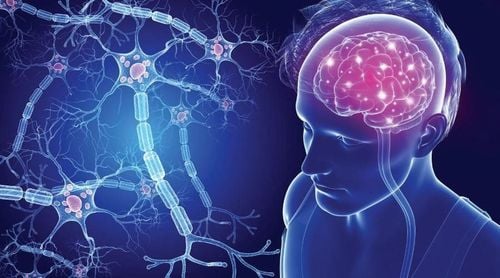This is an automatically translated article.
Multiple Sclerosis – MS can be difficult to detect in its early stages because symptoms can come and go for months or even years without any other symptoms. The first common sign in most people is a feeling of weakness or itching, unexplained numbness, and most often it starts in the leg muscles.
1. How dangerous is multiple sclerosis?
Multiple sclerosis, also known as multiple sclerosis, is an autoimmune disease that affects nerve cells in the brain and spinal cord. It is caused by damaged or inflamed myelin, which disrupts nerve signals, damages nerve fibers, and other symptoms. Patients may have only mild symptoms, very few symptoms, or many symptoms.
Depending on the case, the sequelae of the disease can last forever. One of the dangerous complications of the disease can lead to paralysis, loss of mobility, language or vision...
2. Symptoms of Multiple Sclerosis

Cảm giác mệt mỏi kéo dài, kiệt sức xuất hiện đột ngột hoặc thường xuyên là một trong các triệu chứng của bệnh xơ cứng rải rác
Multiple Sclerosis – MS can be difficult to detect in its early stages because symptoms can come and go for months or even years without any other symptoms. Some specific symptoms of multiple sclerosis that patients may experience during the onset of the disease are as follows:
2.1 Feeling tired, weak The first common sign in most people with the disease is a feeling of weakness muscle or itching, unexplained numbness, and most often start in the leg muscles. Feelings of fatigue and exhaustion can come on suddenly or often. 2.2 Symptoms of muscle pain and contractions Muscle pain and contractions are a fairly common symptom of multiple sclerosis. Leg pain may be accompanied by muscle spasms or stiffness that occurs continuously. More than 50% of people with the disease have symptoms of muscle pain in certain areas of the body, in which, this expression is more common in women than in men.

Rối loạn bàng quang là một triệu chứng khá phổ biến của bệnh xơ cứng rải rác
2.3 Vision disorders The specificity of the disease is to cause nerve damage, so it can also cause disorders to the optic nerve. Manifestations of this symptom are usually blurred or double vision. If you are not experiencing problems due to external factors, then it is very likely that the cause originates from an internal disease. 2.4 Bladder disorders Disorders occur in many organs in the body when you have typical multiple sclerosis. Manifestations of bladder disorders may occur in common patients such as frequent urination, urgency, urinary incontinence. The disease can also affect a person's sexual ability. 2.5 Memory disorders, cognitive disorders Disorders caused by multiple sclerosis can also directly affect the patient's nervous system such as short-term memory and concentration ability; having problems or difficulties in language, arrangement, work organization...
3. Prevention of multiple sclerosis

Bổ sung vitamin Dqua đường ăn uống sẽ giúp giảm bớt khả năng mắc bệnh ở những người có các vấn đề về gen hoặc di truyền
Vitamin D supplementation: Studies have been conducted and show a relatively large association between vitamin D and autoimmune status of the body. Regular vitamin D supplementation, both naturally and through the diet, helps reduce the likelihood of disease in people with genetic or genetic problems.
Pay attention to nutrition: A reasonable and nutritious diet also contributes to disease prevention. In particular, a diet low in saturated fat but rich in omega 3 fats is very good for health and disease prevention. In particular, fish and olive oil are the two food groups that contain the most of these compounds.
Regular exercise: Keeping a healthy body will limit the opportunity for bacteria and viruses to penetrate, thereby, reducing the risk of autoimmune confusion and reducing the possibility of disease; Improve health, strengthen muscle tone and improve body flexibility.
Reasonable rest: Have a reasonable work and rest regime to relax the body and mind. Rest will give the body time to regenerate energy and maintain a healthy body against disease.
Eliminate stress and stress: Avoid frequent stressors because they can affect health and aggravate symptoms in people with multiple sclerosis.
Multiple sclerosis is defined not as a serious or life-threatening disease, but as a disease that currently has no cure and has unpredictable and heterogeneous disease progression in patients .
Therefore, it is very important to recognize symptoms for timely diagnosis and treatment.
Autologous hematopoietic stem cell infusion can alleviate autoimmune reactions and long-term relapses of the disease. At Vinmec International General Hospital, patients with multiple sclerosis have been treated with autologous hematopoietic stem cell transplantation. Transfusion of autologous hematopoietic stem cells is an attempt to "reboot" the immune system, whose job it is to destroy damage to the brain and spinal cord in multiple sclerosis. For autologous stem cell infusion for multiple sclerosis, hematopoietic stem cells are taken from your body (autologous infusion) from your bone marrow or blood, selected and stored before being depleted. the immune system to the full extent of the chemical. The stored hematopoietic stem cells are then passed back to the body. The new stem cells travel down to the bone marrow and over time restore the immune system.
Please dial HOTLINE for more information or register for an appointment HERE. Download MyVinmec app to make appointments faster and to manage your bookings easily.
MORE
Multiple Sclerosis: What to Know What is Multiple Sclerosis (or Multiple Sclerosis)? Causes of multiple sclerosis (MS)













